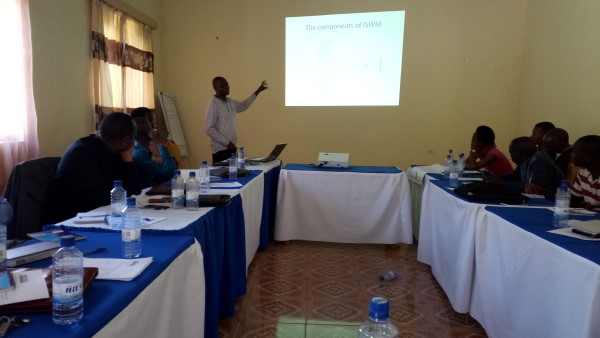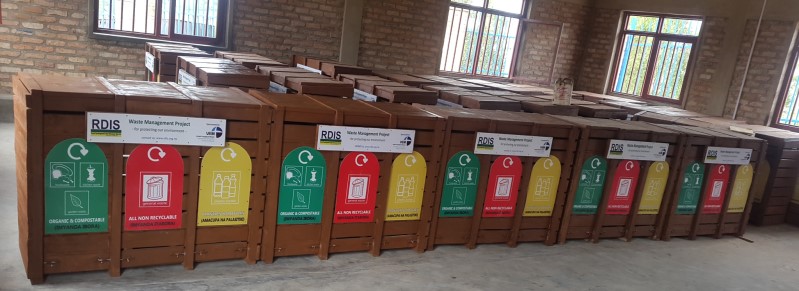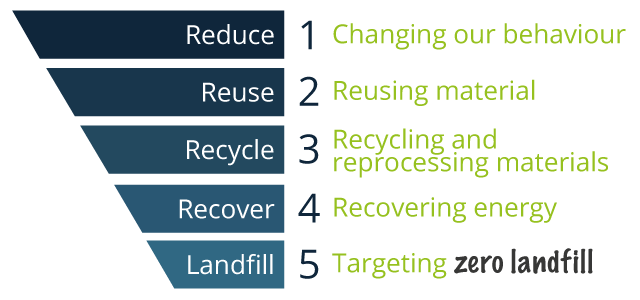Project Synopsis:
African cities, towns and shopping centers are growing rapidly, however, hygiene and sanitation is questionable whereby people’s health is affected due to the poor collection, treatment, transportation, storage, and eventual disposal of waste. The prevailing increase in the level of urbanization in Africa is expected to continue in the future.
RDIS organization is therefore currently implementing a “Waste Management for Environmental Safeguard” project in Rwanda. The beneficiaries of the project are Church’s training centers, guest houses, schools and health centers. Special training is given to managers and personnel of these institutions and people, especially the youth, who are likely to influence others with knowledge and skills about waste management. Special waste bins and policies are distributed to these institutions.
See also:
- RDIS Organisation participation on World’s Environment Day 2018 to demonstrate its initiatives to fight Plastic Pollution
- RDIS Organisation is taking part in the World Environment Day on 5th June 2018 by facilitating a workshop and some actions to #BeatPlasticPollution in Butare diocese.
- Photoalbum: RDIS Actions on World's Environment Day 2018 -- BeatPlasticPollution
Please visit us or call us for more information!
Why are we implementing a waste management project in RwaRwanda?
Background Situation Analysis:
In Rwandan context, waste management is not yet performed; only the collection is properly done in the capital city of Kigali and in the towns located in the country side. In some hotels and guest houses, the status of hygiene and sanitation is doubtful.
The consequences related to poor management of the waste are so many such as: poor hygiene illnesses predominantly prevailing in the growing urban areas, resettlements, public areas where many people gather for some purposes.
Not only the hygiene is damaged by the mismanagement of the waste, but also the physical environment is destroyed by the non-decomposable waste that is thrown into inappropriate areas of the communities. Solid waste management is an issue in both urban and rural areas of Rwanda!
Project Goal:
To improve waste management practices through a participatory process where all key stakeholders contribute to developing and implementing actions to reduce domestic waste through practical, cost effective and sustainable methods.
Project specific Objectives:
- To create awareness of the managers and personnel of church training centers, guest houses, schools and health centers whose responsibilities include hygiene and sanitation.
- To equip the more frequented places of the church with special waste bins for separating degradable and non-degradable waste.
- To develop and to introduce waste management policy and practices likely to enhance hygiene and sanitation.
Progress reports/pictures:
- A special waste bin for sorting garbage at institutional level has been designed by RDIS Organisation. They are now being locally produced for our project, but they are also on sale through our affiliated company.
- Two awareness creation workshops have been carried our succesfully.
- A policy for waste management and sanitation is being developed by RDIS organisation and stakeholders. It is on final touches.

The Training and Awareness Creation for waste management to managers, personnel whose duties include hygiene and sanitation was successfully led by the Environmental Officer from Muhanga district, Mr. MPAGARTSWENIMANA Vedaste, Msc.
Our CALL TO EVERY ONE to reduce waste through practical, cost effective and sustainable methods:
A: Sort Your Waste!
Sorting waste in order to recycle or compost are efficient means to reduce waste. If waste is not separated, it gets mixed up in landfills.
We recommend the use of our locally produced waste bin with three compartments for “organic & compostable materials”, “non-recyclable waste” and “recyclable bottles & plastics”.

These special and locally made waste bins with three compartments are ready for distribution and for sale through our affliated company in Muhanga.
B: Use Waste Hierarchy!
The Waste Hierarchy is a model for sustainable waste management that encourages consideration of waste management praxis and will help everyone to implement policies and practices that will elevate as much waste as possible UP the waste hierarchy!
Simple five-step hierarchy of waste management:

- Waste prevention – by far the most effective way to reduce your waste
- Reuse, repair and refurbish
- Recycle waste into useful materials
- Recovery – converting waste material into useable heat, electricity or fuel; e.g. biomass briquettes
- Disposal such as landfill or incineration without recovery – the last resort.
♥ GO BACK TO THE OVERVIEW.
The project is sponsored by:
The United Evangelical Mission (UEM)
- Communion of Churches in three Continents -
Rudolfstrasse 137
D-42285 Wuppertal
Germany
Website: www.vemission.org
![]() Please download our flier hier.
Please download our flier hier.
